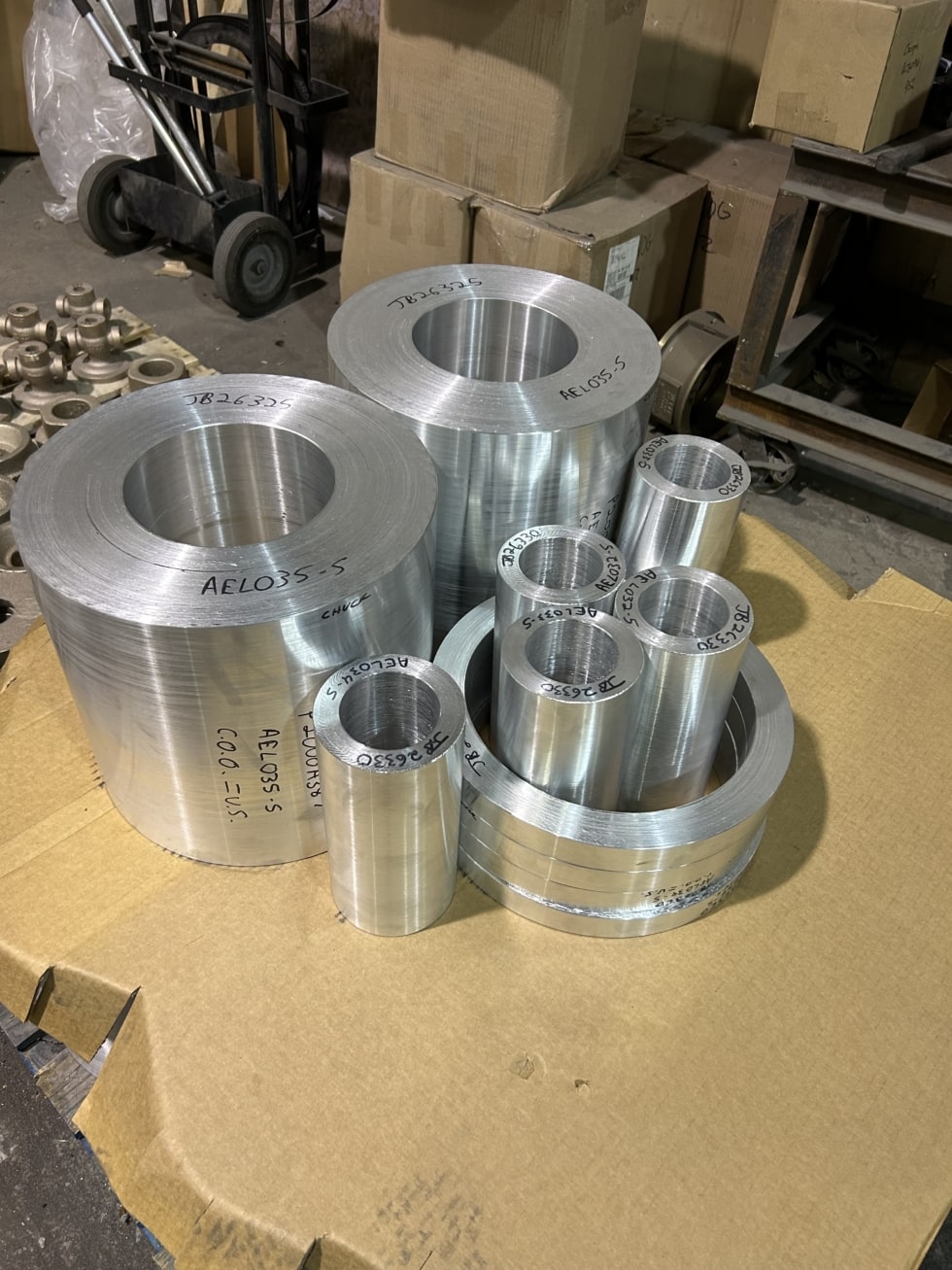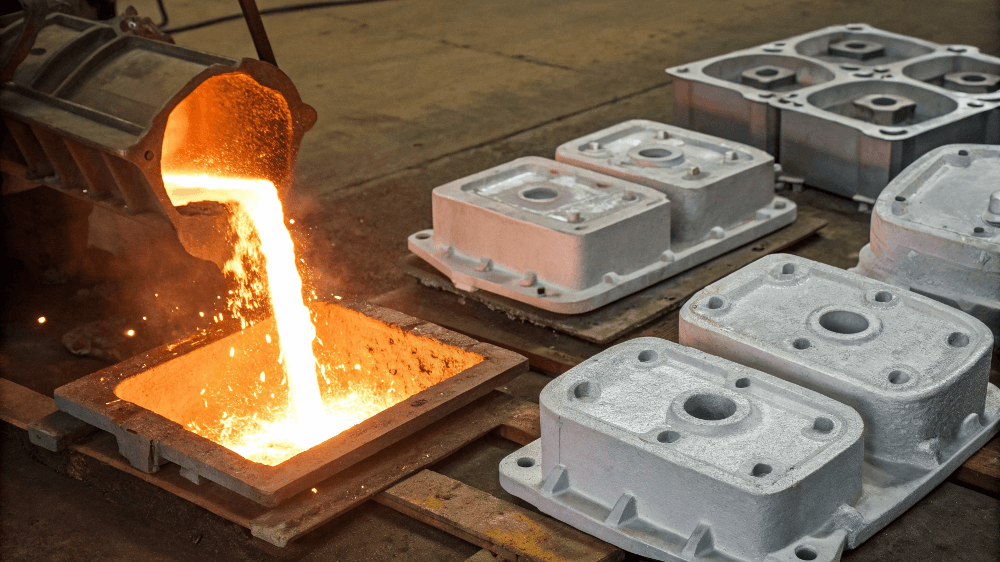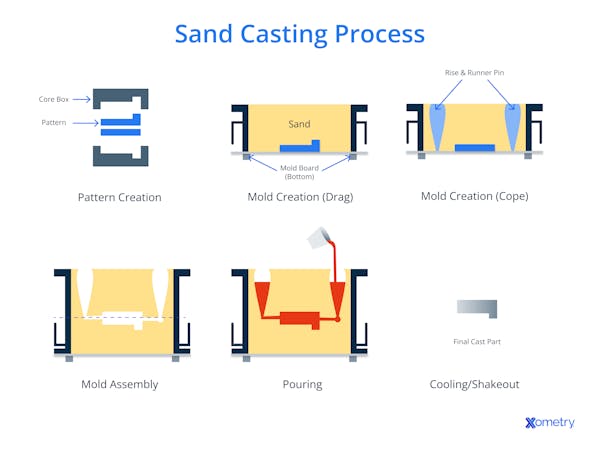Ways Aluminum Foundry Wisconsin contributes to casting productivity
Wiki Article
Recognizing the Advantages and Innovations in the Aluminum Foundry Sector
The Aluminum Foundry industry plays a crucial function in contemporary production. Its lightweight homes especially boost fuel efficiency, particularly in vehicle and aerospace industries. Additionally, Aluminum's resistance to rust warranties long life in numerous applications. As the industry evolves, developments such as sophisticated recycling and additive production are improving manufacturing approaches. Discovering these advancements reveals not only the advantages yet likewise the challenges ahead for Aluminum shops in a swiftly altering market.The Lightweight Benefit of Aluminum
Aluminum's light-weight nature offers significant benefits throughout different markets, especially in production and transport. Its reduced thickness allows for the manufacturing of parts that are easier to handle and mount, leading to decreased labor costs and boosted performance. In the auto field, lighter lorries add to improved gas economic situation and reduced exhausts, straightening with international sustainability goals. In aerospace, the use of Aluminum lowers the general weight of aircraft, which is essential for improving performance and minimizing operational costs.In addition, Aluminum's lightweight residential properties help with cutting-edge styles that were formerly unfeasible with larger materials. This adaptability enables suppliers to create intricate shapes and frameworks while keeping structural honesty. In general, the light-weight advantage of Aluminum not just enhances product efficiency however additionally drives improvements in technology and style, making it a preferred material in numerous applications.
Corrosion Resistance and Longevity
The Aluminum Foundry industry is renowned for creating products with superior rust resistance, making them excellent for various applications. This home, incorporated with enhanced structural stability, adds to the long-lasting efficiency benefits that Aluminum components use. Consequently, sectors significantly rely upon Aluminum to fulfill requiring ecological conditions without compromising high quality.
Superior Rust Resistance
While numerous steels encounter substantial challenges from environmental elements, Aluminum sticks out for its premium deterioration resistance, making it a recommended option in lots of applications. This building is largely due to an all-natural oxide layer that forms on the Aluminum surface, providing a barrier versus wetness and destructive agents. Unlike other steels that might corrosion or break down gradually, Aluminum preserves its integrity even in rough settings, such as seaside locations or industrial settings. Additionally, its light-weight nature incorporated with deterioration resistance makes it suitable for applications in aerospace, auto, and aquatic markets. Generally, Aluminum's exceptional toughness not just improves item durability however also reduces maintenance costs, offering an engaging benefit for customers and makers alike.Improved Structural Integrity
Designers and engineers significantly identify the relevance of boosted architectural stability in modern applications, where both corrosion resistance and resilience are vital. Aluminum alloys, known for their lightweight homes, likewise show extraordinary resistance to deterioration, making them appropriate for harsh atmospheres. The innovative methods employed in the Aluminum Foundry market add substantially to producing elements with improved toughness. Advanced casting processes and alloy make-ups are tailored to satisfy details performance demands, guaranteeing that frameworks can endure severe problems without compromising stability. Moreover, surface area therapies and finishings boost the life expectancy of Aluminum products, additionally reducing degeneration with time. This focus on boosted structural honesty not only extends the functionality of materials yet likewise reduces upkeep costs, solidifying Aluminum's placement as a material of choice in various industries.Resilient Performance Advantages
Resilient performance in Aluminum parts is greatly connected to their exceptional rust resistance and resilience. Unlike numerous metals, Aluminum naturally forms a safety oxide layer, which protects against corrosion and damage in numerous settings, including aquatic and commercial setups. This integral residential or commercial property considerably extends the lifespan of Aluminum items, lessening upkeep and replacement costs. Furthermore, the lightweight nature of Aluminum improves its applicability across markets without jeopardizing stamina. The product's resistance to deterioration additionally adds to its integrity popular applications, making it an excellent option for automobile, aerospace, and construction fields. As sectors progressively prioritize sustainability and long life, Aluminum's performance advantages line up with modern engineering needs, solidifying its role in innovative production processes.Ecological Effect and Sustainability
 As the Aluminum Foundry market develops, it significantly prioritizes ecological influence and sustainability, acknowledging the demand for liable methods despite climate modification. Efforts to lessen waste and power consumption are at the center, with numerous shops taking on recycling efforts to recover Aluminum scrap. This not just decreases resources use yet also notably lowers energy expense, as recycled Aluminum calls for only a fraction of the power contrasted to key production.
As the Aluminum Foundry market develops, it significantly prioritizes ecological influence and sustainability, acknowledging the demand for liable methods despite climate modification. Efforts to lessen waste and power consumption are at the center, with numerous shops taking on recycling efforts to recover Aluminum scrap. This not just decreases resources use yet also notably lowers energy expense, as recycled Aluminum calls for only a fraction of the power contrasted to key production.Additionally, advancements in discharges regulate technologies are being applied to decrease air contaminants, straightening operations with more stringent ecological policies. Factories are additionally discovering alternative power resources, such as solar and wind, to power their centers sustainably. By promoting partnership with stakeholders, the market aims to develop innovative solutions that enhance ecological stewardship. Jointly, these campaigns highlight a dedication to minimizing the Aluminum Foundry's carbon impact while advertising a circular economic climate within the manufacturing industry.
Advanced Production Techniques
 Transforming production processes, the Aluminum Foundry sector is progressively integrating sophisticated production methods to enhance effectiveness and precision. Strategies such as computer mathematical control (CNC) machining and additive manufacturing have actually arised as vital components in enhancing production process. CNC machining permits for high-precision element manufacture, considerably reducing material waste and manufacturing time. Additive manufacturing opens up new methods for complex geometries and light-weight layouts that were formerly challenging to achieve.
Transforming production processes, the Aluminum Foundry sector is progressively integrating sophisticated production methods to enhance effectiveness and precision. Strategies such as computer mathematical control (CNC) machining and additive manufacturing have actually arised as vital components in enhancing production process. CNC machining permits for high-precision element manufacture, considerably reducing material waste and manufacturing time. Additive manufacturing opens up new methods for complex geometries and light-weight layouts that were formerly challenging to achieve.In addition, the implementation of automation and robotics in Aluminum factories streamlines operations, lessens human mistake, and boosts worker security. These technologies facilitate an even more responsive production setting, enabling manufacturers to adapt rapidly to market needs. The assimilation of sophisticated simulation software better improves the layout and screening stages, causing premium product top quality. Jointly, these strategies not only enhance operational effectiveness yet additionally foster development, positioning the Aluminum Foundry industry at the forefront of contemporary manufacturing.
Advancements in Reusing Procedures
The Aluminum Foundry industry is not just progressing in making methods yet is also making significant strides in recycling procedures. Advancements are emerging to enhance the efficiency of reusing approaches, minimizing energy usage and improving sustainability. Advanced arranging technologies, such as computerized optical sorting, enable the recognition and separation of Aluminum from other products with high precision. This results in a better of recycled Aluminum, which is essential for maintaining the honesty of the last items.
Additionally, closed-loop recycling systems are being executed, allowing manufacturers to recycle Aluminum scrap within their own production processes. This decreases waste and promotes a circular economic situation. In addition, study into brand-new recycling techniques, such this post as hydrometallurgical processes, offers the possibility for recuperating Aluminum from complicated waste streams. These developments not only add to lowering the carbon impact of the Aluminum Foundry industry yet likewise boost its financial practicality in an increasingly environmentally conscious market.
Applications Throughout Various Industries
Numerous industries are progressively identifying the convenience and benefits of Aluminum Foundry products, bring about extensive applications throughout fields such as automotive, consumer, aerospace, and check that building items. In the vehicle sector, Aluminum castings contribute to lightweight lorry layouts, enhancing fuel effectiveness and performance. Aerospace makers make use of Aluminum parts for their strength-to-weight proportion, necessary for airplane frameworks and parts.In building and construction, Aluminum is preferred for its resilience and resistance to rust, making it excellent for home window frames, roof, and architectural assistances. Durable goods additionally take advantage of Aluminum Foundry products, as seen in kitchenware, electronic devices, and product packaging, where light-weight and recyclable materials are important.
The versatility of Aluminum Foundry methods permits exact requirements and intricate layouts, dealing with the diverse needs of these markets. Consequently, Aluminum Foundry items are becoming essential to contemporary production procedures throughout different sectors.
Future Trends in Aluminum Foundries
As industries remain to develop, Aluminum factories are poised to embrace a number of essential patterns that guarantee to enhance efficiency and sustainability. One prominent fad is the raising adoption of electronic technologies, consisting of automation and fabricated intelligence, which enhance procedures and enhance quality assurance. On top of that, the press towards lasting practices is leading shops to purchase reusing innovations, significantly reducing waste and power intake. Another arising fad is making use of innovative alloys and materials, providing to the expanding demand for resilient and light-weight parts across different markets (Aluminum Foundry). Moreover, the combination of additive production strategies is anticipated to reinvent component layout, providing modification and reducing lead times
Another arising fad is making use of innovative alloys and materials, providing to the expanding demand for resilient and light-weight parts across different markets (Aluminum Foundry). Moreover, the combination of additive production strategies is anticipated to reinvent component layout, providing modification and reducing lead timesPartnership with study establishments is likewise expected to drive innovation, as shops look for to establish new you could check here processes and materials. Aluminum Foundry. Collectively, these patterns show a transformative future for the Aluminum Foundry market, straightening with wider objectives of sustainability and effectiveness
Frequently Asked Questions
What Are the Typical Expenses Connected With Aluminum Foundry Manufacturing?
The normal costs connected with Aluminum Foundry production consist of resources, labor, power, tools upkeep, and overhead costs. These variables jointly affect the general monetary investment required for efficient Aluminum spreading procedures.Exactly How Does Aluminum Compare to Other Metals in Toughness?
Aluminum, while lighter than several steels, displays excellent strength-to-weight proportions. Compared to steel, Aluminum is less solid however provides outstanding rust resistance, making it a positive selection in applications where weight and toughness are important.What Precaution Remain In Area in Aluminum Foundries?
Safety measures in Aluminum shops generally include compulsory personal protective equipment, air flow systems to control fumes, normal devices maintenance, training programs for workers, and adherence to strict safety guidelines to reduce threats connected with molten steel handling.How Is Quality Assurance Managed in Aluminum Casting Processes?
Quality control in Aluminum spreading processes entails extensive evaluations at numerous phases, consisting of resources evaluation, process surveillance, and end product screening. Techniques such as statistical process control and non-destructive testing assurance adherence to sector requirements.What Certifications Are Important for Aluminum Foundry Providers?
The value of qualifications for Aluminum Foundry vendors consists of ISO 9001 for top quality monitoring, ISO 14001 for environmental administration, and industry-specific requirements like ASTM and SAE, making sure compliance, security, and reliability in making procedures.The Aluminum Foundry market plays a vital function in modern manufacturing. The Aluminum Foundry sector is renowned for generating products with exceptional rust resistance, making them ideal for different applications. Reinventing manufacturing procedures, the Aluminum Foundry industry is increasingly integrating sophisticated production strategies to enhance efficiency and precision. The Aluminum Foundry market is not just advancing in making methods yet is also making considerable strides in reusing processes. As markets proceed to develop, Aluminum factories are poised to accept a number of essential fads that promise to enhance efficiency and sustainability.
Report this wiki page